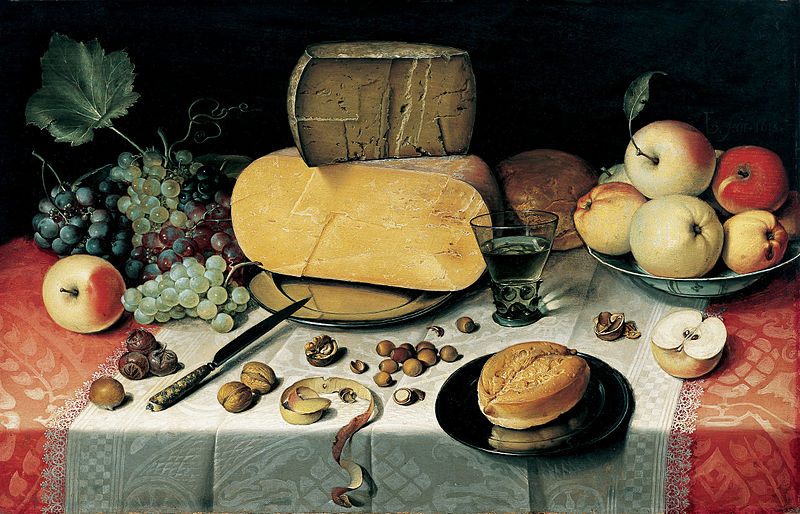By guest contributor Lillian Vogl
This post is a part of the Patheos Catholic Channel series, “Catholicity: Identity and Its Discontents.” Read more here.
I am a Catholic, not due to the way I act, the things I believe, who I am, who I am not, my perception of myself or others’ perception of me, or the people with whom I am close friends. I am a Catholic due to one simple thing: what I receive.
A Catholic in full is a person who has received at least four sacraments, two of them frequently. These sacraments that mystically incorporate us into the divine Body of Christ are the essence of Catholic identity. I am grateful beyond all telling to be a Catholic and receive these infinite gifts.
The first sacrament, Baptism, I received when I was two weeks old. I fully believe in the mystical efficacy of this “one Baptism,” because nothing else explains to me how I, baptized in a Presbyterian church and raised to believe that we are sinners in the hands of an angry God—a strict disciplinarian Father—had such a deep personal affection for Jesus since my earliest memories, and instinctively knew that the theology I was being taught and the example I was being given was in many ways flawed. I was still a baby catholic, as I had received divine adoption into the mystical universal Church.
This grace that gave me a love of God but also the restlessness of a heart that still had not found rest in Him, led me to do a lot of spiritual hunting in my teens. Some hunting was intellectual, but I also hunted for that sense of the Holy Spirit’s indwelling. I went to Evangelical churches, Pentecostal, Reformed, Baptist, and even skeptically sat through Lutheran confirmation classes as an 8th grader in a somewhat-alien parochial school. None of it eased the unease; it only led to more.
When I was 20 I first encountered Catholics who actually knew much about their faith and could give an intelligent defense. Heretofore I knew plenty of Catholics, but it seemed to me that their identity as Catholics was simply something they were born into. They could scarcely explain what it was to be a Catholic or why they were one, except to shrug and say “it’s expected of me.” But I started reading the Catholic Catechism, and was given a couple other books explaining the rationale for the Catholic belief in the magisterium, as well as a recapitulation of the covenant theology I had been taught in college but now with Mary and the Eucharist revealed. Finally an intellectual explanation clicked, and I decided I should lay hold of it, despite the “community” aspect of the Body of Christ appearing rather weak to me in Catholic parishes.
Coming into the Catholic Church, I thought that being Catholic was primarily about what I believed, and most particularly, an intellectual obedience to the magisterium. Obviously actions were supposed to follow this intellectual asset, though as a practical matter we’re all still sinners, and confession is there to take care of shortfalls. I didn’t expect that a sense of belonging would be part of it. There were so many factions I saw, from the apathetic uncatechized Catholics I knew in childhood, to the anti-abortion activists who appalled me with their aggressive tactics, to the Pentecostal Catholics, to the Opus Dei crowd who was trying to pull me in to more than the daily Masses I attended at one of their chapels. Again, none of them seemed to fit me, but I told myself I didn’t really care as long as I could say I was following “official” Church teaching.
On Easter Vigil 1998, I first discovered that being a Catholic was something I received. Receiving the sacred chrism of Confirmation and Holy Communion for the first time, I sensed the mystical indwelling of the Presence in a way that cannot be adequately described. Great joy and peace filled my soul, not because of anything I had done, or anyone else had done, but because of what I had received. I wanted to hold on to that sense forever, so I set about trying to take hold of more of it. I turned to my old habits of trying to apprehend more intellectually by reading Catholic authors ancient and contemporary. I tried to make more Catholic friends as well. Both tended to distract me from simply going to Mass as frequently as possible and receiving the Word made Flesh with an open heart.
Even as the initial euphoria wore off, I was still a Catholic. Even as I questioned this or that thing that supposedly was “official” Church teaching, I was still a Catholic. Even as I walked into and out of a marriage that manifested no sacramental graces, I was still a Catholic. Even as I was snubbed or lectured by other parishioners for being a working mother and not able to construct a perfect Catholic household, I was still a Catholic. Even as I kept receiving Holy Communion at least weekly but often with a distracted or downcast heart, I was still a Catholic. I kept receiving something, and it was impossible for me to negate what I had already received.
As some point, probably having received intercession from the Communion of Saints, I began to be conscious of this. I let go of my white-knuckled determination to hold on to my Catholicism by following “the rules.” I began to go to Mass more frequently again, simply consciously receiving the divine indwelling and giving thanks for that gift. Gradually I began to see all these things added unto me. A greater awareness of the Holy Spirit in my life. Greater charity. Greater trust and joy regardless of circumstances. Greater graces from more frequent confession. Greater graces in my marriage and family life. Greater understanding of Scripture and the essentials of the Catholic faith. Eventually even a parish community where I feel accepted by and connected to my fellow parishioners and well-pastored by our priests.
But I was always a Catholic. Once I had received the sacraments of initiation, I could never be anything else. I understand better now my childhood Catholic friends and acquaintances who were “just born into it.” So was I, born of the Spirit, just a few years older than most of them, without any family members who “expected it” of me. I am no more or less Catholic than they are.
I do not discount them as “cafeteria Catholics” anymore. In a cafeteria we reach out and grab the food we want, and we pay for it. The Catholic Church is no cafeteria—it is a banquet table set with infinitely more graces than we can ever consume, so of course we will not be able to take in everything that is there and incorporate it into our bodily life. The more we go to the banquet, and the emptier our stomachs are when we go, the more we can consume, but receiving it all will take an eternity. Knowing this, I am in no place to judge another’s Catholicity by what they haven’t consumed yet. They have been invited to the banquet, and I wish to encourage them to come and receive more graces than they already have. In doing so, it is important to emphasize that unlike a cafeteria, they do not need to pay for what they get; what they receive will be purely gratuitous. God only asks that, having received, we give thanks and do not vomit it out or hoard it away from others, unconsumed and unnourishing.
It is the “manna hoarders” who grieve me more now, not the Catholics who are afraid to gather it up because they are insufficiently catechized in its benefits and fear they will have to pay for it. I believe Christ’s greatest agony is caused by the lay teachers and leaders, and most of all the priests, who block or scare away others from approaching the feast He has set out in the great hall of the Catholic Church. Certainly His harshest words in the Gospel were directed toward the Pharisees and other religious leaders who lay burdens on others, while the bruised reeds like the woman caught in adultery and the thief on the cross He did not break. Any definition of Catholic that refers to what a person possesses, or what a person has done, rather than what a person receives, is manifestly a false one. I would go so far as to call it demonic.
To the leaders of the Catholic Church, Jesus says “As you go, make this proclamation: ‘The kingdom of heaven is at hand.’ Cure the sick, raise the dead, cleanse lepers, drive out demons. Without cost you have received; without cost you are to give.” (Mt. 10:7-8) And for all Catholics, “from His fullness we have all received, grace in place of grace.” (Jn 1:16) The New Testament talks about faith, knowledge, grace, and salvation being “received” 167 times! Undoubtedly our Catholic identity is received; let us simply receive it with greater thanksgiving, and do not hinder the little ones from receiving it also.
Image credit: https://commons.wikimedia.org/wiki/File:Floris_Claesz._van_Dyck_001.jpg. PD-US













